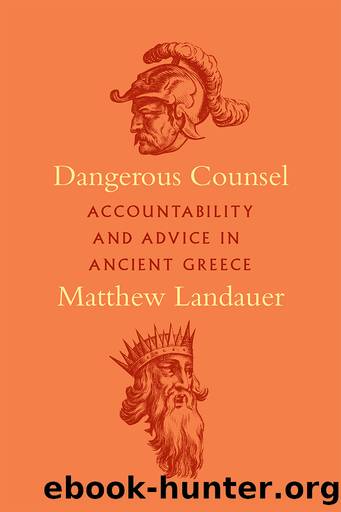Dangerous Counsel: Accountability and Advice in Ancient Greece by Matthew Landauer;

Author:Matthew Landauer; [Landauer, Matthew]
Language: eng
Format: epub
Tags: POL000000 POLITICAL SCIENCE / General
ISBN: 9780226654010
Publisher: University of Chicago Press
Published: 2019-11-12T00:00:00+00:00
IV. Conclusion
I want to close with a discussion of the Sicilian expedition, the Athenian defeat that serves as the climax of Thucydidesâ narrative. Thucydidesâ portrayal of the debates over the decision to invade Sicily both confirms and undermines Diodotusâ and Cleonâs analyses of Athenian discursive practices. In 415 BCE, at the urging of their allies the Egestans, the Athenian assembly votes to send an expeditionâled by Alcibiades, Nicias, and Lamachusâto Sicily to aid the Egestans in a conflict against the Selinuntians (6.8). Notwithstanding this pretext, Thucydides claims that they were really motivated by a wish âto rule over the whole islandâ: to expand their empire into the western Mediterranean (6.6.1). This was an ambitious and audacious plan, not least because, although now at peace with the Spartans (since 421 BCE), relations were still unstable. Without even knowing itâThucydides stresses Athenian ignorance of Sicilyâs population and sizeâAthens was committing itself to a second âwar on almost the same scale as that against the Peloponnesiansâ (6.1.1). A second assembly meeting is held to discuss the outfitting of the expedition, and here Thucydides records the speeches of Nicias and Alcibiades. Nicias speaks against the expedition, urging the Athenians to reconsider âwhether it is right to send the ships at allâ (6.9.1); Alcibiades speaks in favor. When it looks as though the Athenians will follow Alcibiadesâ advice, Nicias takes a risk: ârealising that he could now no longer deter them by repeating his original arguments but that he might perhaps change their minds by stressing the scale of the resources requiredâ (6.19.2), he proceeds to describe the immensity of the undertaking (6.19â23). As Thucydides writes, âThe result was just the opposite of what he had expectedâthey thought that he had given them good advice and that now the safety of the enterprise would be fully assured. Everyone alike had fallen in love with the voyage. . . . And so, in the face of this extreme passion on the part of the majority, anyone who felt otherwise was afraid of seeming disloyal if he voted against and therefore held his peaceâ (6.24). The assembly subsequently votes to send a massive expedition to Sicily. The Athenians are ultimately thoroughly defeated with a tremendous loss of resources and lives. As Thucydidesâ concludes the Sicilian narrative, âFew out of many returned homeâ (7.87.6).
Scholars have long seen parallels between Thucydidesâ depiction of the Sicilian debate and Herodotusâ depiction of Xerxesâ war council before the invasion of Greece (analyzed above, in chapter 3). The decision to invade Sicily, like Xerxesâ decision to invade Greece, is the result of an overwhelming (even tyrannical?) desire for empire.56 Both debates take place âafter a decision has already been made.â57 Alcibiades and Mardonius are each cast in the role of agitator, attempting to persuade a decision-maker to undertake an invasion that may not be in their best interest. Each does so in part out of personal motives: Mardonius wishes to become governor of Greece, and Alcibiades believes that his successful command of the expedition will âpromote both his personal wealth and his reputationâ (6.
Download
This site does not store any files on its server. We only index and link to content provided by other sites. Please contact the content providers to delete copyright contents if any and email us, we'll remove relevant links or contents immediately.
The Daily Stoic by Holiday Ryan & Hanselman Stephen(3109)
The Fate of Rome: Climate, Disease, and the End of an Empire (The Princeton History of the Ancient World) by Kyle Harper(2870)
People of the Earth: An Introduction to World Prehistory by Dr. Brian Fagan & Nadia Durrani(2619)
Ancient Worlds by Michael Scott(2492)
Babylon's Ark by Lawrence Anthony(2428)
Foreign Devils on the Silk Road: The Search for the Lost Treasures of Central Asia by Peter Hopkirk(2385)
The Daily Stoic by Ryan Holiday & Stephen Hanselman(2343)
India's Ancient Past by R.S. Sharma(2294)
MOSES THE EGYPTIAN by Jan Assmann(2275)
The Complete Dead Sea Scrolls in English (7th Edition) (Penguin Classics) by Geza Vermes(2135)
Lost Technologies of Ancient Egypt by Christopher Dunn(2110)
The Earth Chronicles Handbook by Zecharia Sitchin(2100)
24 Hours in Ancient Rome by Philip Matyszak(1973)
Alexander the Great by Philip Freeman(1960)
Aztec by Gary Jennings(1877)
The Nine Waves of Creation by Carl Johan Calleman(1783)
Curse Tablets and Binding Spells from the Ancient World by Gager John G.;(1768)
Before Atlantis by Frank Joseph(1740)
Earthmare: The Lost Book of Wars by Cergat(1715)
